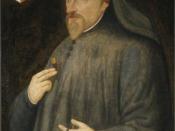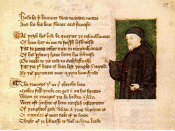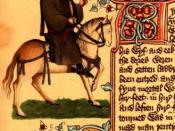Geoffrey Chaucer (1340-1400) was a court poet for Edward III and Richard II. This meant that he was writing for the Aristocracy, an educated audience. Because of this, Chaucer's fables have references to educated sources.
'The Nun's Priest's Tale' (from 'The Canterbury Tales') starts off with some philosophy about free choice. Chaucer implies that is there such a thing as free will or has God got everything pre-ordained? This is even on the level of a cockerel eating worms with his seven hens.
The next example of Chaucer's education comes when, in 'The Nun's Priest's Tale', he produces a subtle attack on the reliability of women. He quotes a Norse proverb that roughly means "Women's advice is often flawed"; he also says that Eve got Adam kicked out of Eden because of her advice. This shows that Chaucer is an educated man, having made reference to philosophical text and the Bible.
At the end of this paragraph, Chaucer claims that he does not mean it, he is only joking:
Thise been the cokkes wordes nat myne:
I kan noon harm of no woman divyne.
It seems that he is just trying to get out of an opinion that may offend.
Phisiologous is a book (or the author of this book) about many animals and precious stones and their religious overtones; this book is mentioned in the next paragraph. This scientific text adds another discipline to the list of his educational references.
Angela Carter is a modern-day fable writer whose techniques differ greatly to those of Chaucer. The main difference is that her fables are very offensive; where Chaucer's stories contain subtle attacks and then covering up, Carter's stories contain sex, murder, necrophilia, dark ideas and a lot of horror. Also, Chaucer's stories have happy endings and...


